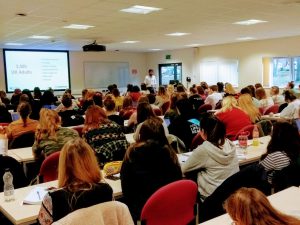By: Mirjana Sokolovic-Perovic, m.sokolovic@reading.ac.uk, Jayne Freeman, j.e.freeman@reading.ac.uk, Psychology and Clinical Language Sciences

Overview
This case study outlines how PCLS designed an induction booklet for UG programmes to provide additional pre-arrival support during transition into higher education. Psychology and Speech and Language Therapy students reported that they found the induction booklet useful and that it helped them to feel more prepared for university.
Objectives
- To provide essential information about the course and university life before students arrive
- To prevent information overload in Welcome Week by phasing information delivery into pre-arrival period
- To support students in their transition to university by engaging them early with the School and their chosen programme
- To reduce student anxiety about the transition to Higher Education
Context
Successful transition to university life is related to a range of outcomes including student retention, academic success and mental wellbeing (e.g., Cage et al., 2021). However, our students often report being concerned about joining university and feeling overwhelmed with the new information.
Traditionally, students receive a wealth of information during the Welcome Week, but it has been argued that transition should be viewed as a process. The induction could be extended into the pre-arrival period, putting the emphasis on early engagement. Successful pre-arrival interventions include various orientation plans, mentoring schemes, and programme-specific transition programmes (McInnis et al., 2000).
Early engagement should help students understand academic procedures and expectations, as well as help them develop a relationship with the institution and feel part of the learning community. Thus, we wanted to design a pre-arrival intervention to support students to feel more prepared for entering university.
Implementation
We prepared induction booklets for our UG programmes: BSc and MSci Psychology, and MSci Speech and Language Therapy (SLT), which included essential information:
- key members of staff,
- term dates,
- an overview of teaching and assessments of Part 1 modules,
- information about Blackboard and University Library,
- information about various ways of supporting students and the course rep system,
- how students can get involved with the School,
- useful links,
- a schedule of the Welcome Week events.
At the end of August 2023, booklets were emailed to all students who had accepted a place on one of the programmes.
Students were asked to fill in a short questionnaire in week seven in the Autumn term to indicate if they had read the booklet, and if they did, how useful they found it, and to what extent it helped them feel more prepared for university study (both on a scale 1-5). We also asked if they had attended the relevant ‘Programme Briefings’ and ‘Transition to Higher Education’ sessions in Welcome Week to examine if reading the booklet had negatively affected attendance.
Impact
Sixty-two UG Psychology students and twenty-six MSci SLT students completed the questionnaire. Overall, students reported that the induction booklet was useful and that it helped them prepare for university.
Students who read the induction booklet considered it useful: the average rating was 3.72 for UG Psychology, and 4.17 for MSci SLT (75% rated it 4 or 5). They also felt more prepared for university, with the average ratings of 3.39 for UG Psychology and 3.82 for MSci SLT (50% rated it 4 or 5).
Programme Briefings were attended by 81% of UG Psychology and 92% of SLT respondents. Of those who had read the induction booklet, 75% and 92% (respectively) attended this session. ‘Transition to HE’ sessions were attended by 42% of UG Psychology and 77% of SLT respondents; 53% and 75% (respectively) of those who had read the induction booklet attended. Attendance was similar for those who had not read the booklet. Therefore, our concerns about a possible drop in attendance/engagement were not warranted.
Reflections
In light of the findings, we will continue to implement the induction booklet for future cohorts as part of our approach to supporting students in their transition to higher education.
While this investigation has given us important insights into the benefits of using the induction booklet, on reflection, we would have ideally administered the questionnaire shortly after Welcome Week while the booklet was still fresh in students’ minds. Students may not have accurately remembered the extent to which they had found the booklet useful or whether reading the booklet had impacted their attendance at the Welcome Week sessions. We will repeat the evaluation of the induction booklet again next year but will administer the questionnaire during the first two weeks of the semester to gain more contemporaneous feedback. Not all students read the booklet so we will also examine reasons why this might have been.
Follow up
There are some important questions that warrant further investigation. For example:
- Whether the booklet may be more helpful for some students than for others (e.g., students with higher levels of pre-arrival anxiety and/or first-generation students)?
- Which parts students found the most helpful and whether any further information would have been useful?
- Why some students did not read the booklet?
References
- Cage, E., Jones, E., Ryan, G., Hughes, G., & Spanner, L. (2021). Student mental health and transitions into, through and out of university: student and staff perspectives. Journal of Further and Higher Education, 45, 1076-1089. https://doi.org/10.1080/0309877X.2021.1875203
- McInnis, C., James, R., & Hartley, R. (2000). Trends in the first year experience. AGPS.












